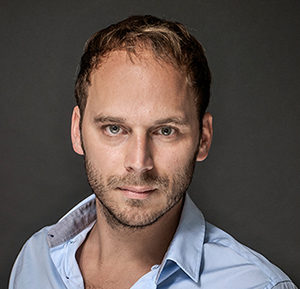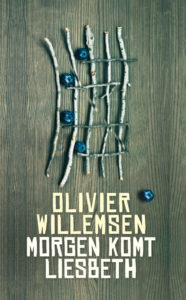‘There is beauty to be found in the lives of my characters‘
The latest novel from the awarded writer Jesmyn Ward is a sinister road trip through the poor South of the United States. Sing, Unburied, Sing is the first of her novels to be translated into Dutch. I meet her in a coffee shop close to her favorite bookstore in New Orleans.
One of your favorite quotes is by William Faulkner: “To understand the world, you must first understand a place like Mississippi.” After reading Sing, unburied, Sing I think I understand life in America’s poorest state a little bit better. Is this what you set out to do?
One of the reasons I appreciate that quote so much is because I’m a black writer from Mississippi. There are stories there that need to be heard. I want to tell the forgotten stories. That’s why I had to write this book.
You tell the story of Leonie, an addicted black mother from Mississippi. She has two bi-racial children: Jojo and Kayla, for whom she’s doesn’t care very well. That’s the job of her parents. Leonie, Jojo, Kayla and Misty (a friend of Leonie) set out on a road trip to pick up the children’s white father Michael, who has been released from Parchman Farm Prison. This goes against the will of the grandparents, because the trip takes place during schooldays. What sparked the idea for this story?
I wanted to write about a road trip through modern Mississippi, where strange things would happen to a family. Then I started to do research, and soon I read more about Parchman. The story that I initially set out to make wasn’t enough. That wasn’t where the fire was. It was in Parchmen. Black people were detained for the smallest things, like vagrancy, and forced to work. They were enslaved. Amongst these people were also minors, children like Richie. I just had to write about them, I realized the moment I started reading about them.
Richie is a spirit from the past who was brutally murdered as child, like many inmates. He’s a ghost from Parchman Farm Prison who travels back with the family after they pick up Micheal. What was it like to embody him?
I wanted to give him a voice. I wanted it to be believable. I wanted it to take place in the present. To do all those things I had to make him into a ghost. I had to construct a world where ghosts exist. As real, as vivid as possible. Never before had I used magical realism in my work. I had to do it. I wanted to show that the past still resonates in the present. That’s why he had to be a ghost. Only in the tenth revision I dared to do it.
Why then?
I had to embody a child that really existed, knowing that the child was tortured and died a horrifying death. That had to be done right. Personally it was hard because of my brother [Ward’s brother died at nineteen in a car accident; killed by a white man who was drunk driving. She wrote about it in her memoir Men We Reaped, Ed.] In everything I write I create a shadow of my brother, to keep him alive in a certain way. If I don’t write about him, who will? Richie is the most important character for me. He brings the past and the present together.
You have revised the novel fifteen times. What changed with every draft?
First I write a rough draft. If I discover a flaw four chapters in, I keep writing forward. I don’t go back to the beginning. Then I let it sit for two to three weeks. After that period of time I make a list of improvements. I go over the list one by one. I go back and do a complete revision with just the first point. That’s how I work through the list. My fear is that I mess up if I deal with all of them together at once. Only when that’s done I’ll ask a group of writer friends to please read it. I’ll give them three months. After I have revised their feedback, I’ll send it to my editor. I was lucky with Salvage the Bones; there were not a lot of notes. It didn’t go like that with Sing. On almost every page there was a note. With every book I write, I fear “how do I get all of this in?” I’m in no way a confident person, especially when it comes to my work. I feel inadequate.
You won the National Book Award twice, for Salvage the Bones and Sing, Unburied, Sing, last year you received the MacArthur Genius Grant. How is it possible that you still feel insecure? And how do you cope with feeling that way?
It’s who I am. I can’t change that. I feel so desperate to tell stories. The need to do so is bigger then my insecurity. That wins.
On the way back from the road trip the family is being pulled over by the police. Almost everything that can go wrong, goes wrong. How did you set up this chapter?
During the writing of this novel, almost every month a black man was being killed by a policeman. I knew from the beginning that they had to be pulled over. They’re poor, they drive a shitty car, the mom is black. I knew that scene was coming, but still I wasn’t emotionally prepared. I don’t plot, I’m a pantser. That moment was important; I didn’t know what would happen. I wrote blindly. Maybe Jojo would die. I know the characters well, they lead me. I think it’s important that I didn’t know. I think the reader feels that.
The contrast between the poetic prose and the harsh environment of the story is very distinctive. Was that a deliberate choice?
My prose is poetic because of that. I’m not sure if this also counts for the Netherlands, but in the US there is a trend to write clean, straight forward, without adjectives, no metaphors. That’s not what attracted me to literature. Those things made me love reading. I think my work would be very hard to read if the prose was spare. I feel like there has to be some beauty to endure. It also shows that there is beauty to be found in the lives of my characters. Leonie might be a bad mom, but in her heart she has love for her brother.
Even though Leonie neglects her children, I did feel sympathy for her. How was that for you?
In the beginning, I had a hard time writing from her perspective. Jojo came to me first. He demanded that I tell his story. Leonie was difficult. She’s awful to the people who love her. Still I can’t change her, she is who she is. What if she lost a brother, I thought. Is it possible she’s so horrible to everyone because of grief? Then I wrote about how her brother had lived and how he died. Then Leonie made sense. She can’t sit with loss. She glances at it, but can’t sit with it. In order to be healing you have to learn how to sit with it. Leonie keeps running away from it. Everyone who has lost someone knows it won’t go away. You have to accept the pain. You hurt, you cry.
You say you can’t change Leonie even though you are the writer. Could you explain that?
It’s hard actually to explain. A character presents itself. As a writer I can build on that, but the core will remain the same. That’s impossible for me to change.
Do you know women like Leonie?
Unfortunately, yes. I come from a really small town in Mississippi where mostly working class or poor people live. It’s a very tight community, generations after generations keep living there. A lot of the people have to walk a tightrope. They live from hustle to hustle, being hungry and poor. Lots of them fall prey to addiction. Age range from teens to elderly. Everything comes later to Mississippi. For a long time it, was crack cocaine. Now it’s meth and opiates. It’s not an easy thing to try to solve. There’s so much behind addictions, like poverty, stress of racism, bad education, so many factors. Drugs are a secret relief. That’s what it is to Leonie.
In your acceptance speech for your already second National Book Award you started with a rejection from a publisher early on in your career: “People will not read your work, because these are not universal stories.” Thousands of people read your work, it will be translated into many languages. Your stories prove to be very universal. What is it in your stories that make them indeed so very universal?
The publication of my first novel was a battle. The first reaction often was: why is this relevant? If your characters don’t look like the majority, your work is not recognizable. People are looking for similarities. After winning the first National Book Award, people started to see something. What does it mean to be human? What does it mean to maintain relationships? What does it mean to love someone and lose them? Yes, these are stories about black poor people, and they are just as relevant. They are universal.



